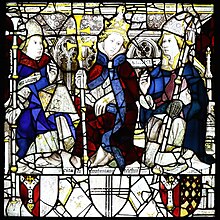
Quick Facts

Biography
Pope Celestine III (Latin: Caelestinus III; c. 1106 – 8 January 1198), born Giacinto Bobone, reigned from 30 March or 10 April 1191 to his death in 1198. He was born into the noble Orsini family in Rome and served as a Cardinal-Deacon prior to becoming pope. He was ordained as a priest on 13 April 1191 and he ruled the church for six years, nine months, and nine days before he died aged 92. He was buried at the Lateran.
Biography
Cardinal
Considered by the Roman Curia as an expert on Spain, Bobone conducted two legatine missions to Spain in (1154–55) and (1172–75) as the Cardinal-Deacon of Santa Maria in Cosmedin.
Pontificate
He crowned the Holy Roman Emperor Henry VI on the day after his election in 1191 with a ceremony symbolizing his absolute supremacy, as described by Roger of Hoveden, after Henry VI promised to cede Tusculum. Later in the same year he threatened to excommunicate King Tancred of Sicily, forcing him to release his aunt Empress Constance, who was wife of Henry VI and a contender of Sicilian crown, captured by Tancred earlier the same year, to Rome to exchange for his recognition of Tancred while also put pressure on Henry, but Constance was released by German soldiers on borders of the Papal States before reaching Rome the following summer. He subsequently nearly excommunicated the same Henry VI for wrongfully keeping King Richard I of England in prison. He placed Pisa under an interdict, which was lifted by his successor Innocent III in 1198. He condemned King Alfonso IX of León for his marriage to Theresa of Portugal on the grounds of consanguinity. Then, in 1196, he excommunicated him for making peace with the Muslims while making war on Castile. Following his marriage with Berengaria of Castile, Celestine excommunicated Alfonso and placed an interdict over León.
In 1198, he confirmed the statutes of the Teutonic Knights as a military order.
Death

He would have resigned the papacy and recommended a successor (Cardinal Giovanni di San Paolo, O.S.B.) shortly before his death, but was not allowed to do so by the cardinals.
